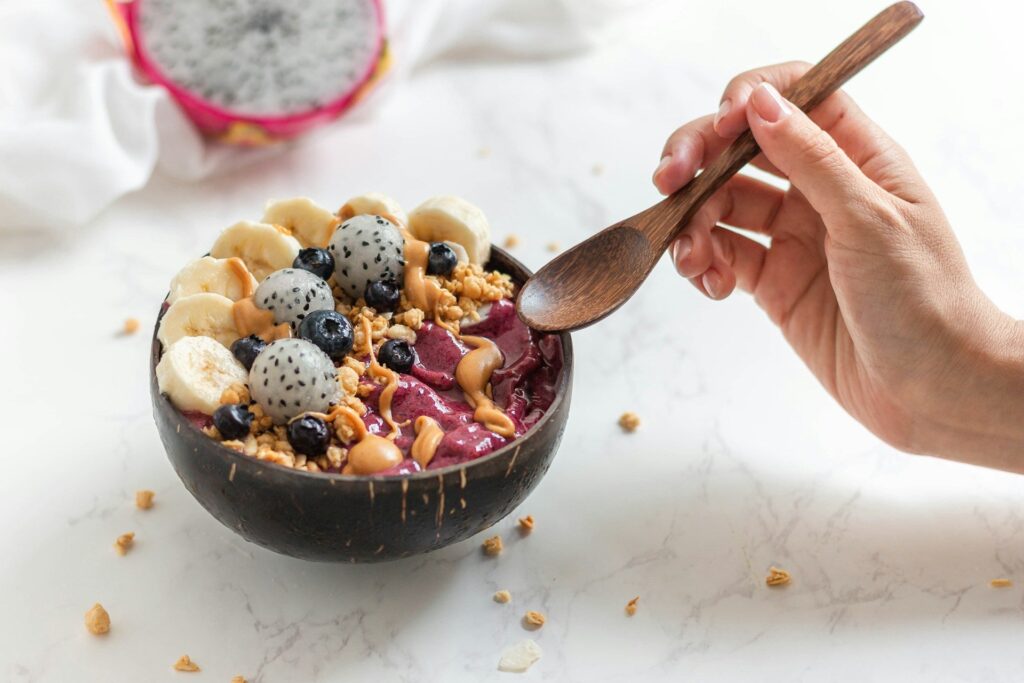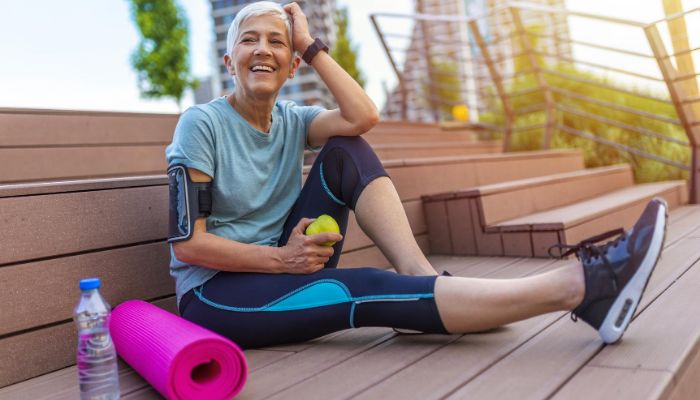
In this guide, we explore the importance of proper nutrition to optimize your exercise routine. Learn about the best foods to eat before and after your workouts to enhance energy, boost performance, and speed up recovery. Discover the right balance of carbohydrates, protein, fats, and hydration for your fitness goals.
Why Nutrition Matters for Exercise
Before we talk about what you should eat before and after your workout, let’s take a moment to understand why nutrition is so important for exercise.
When you exercise, your body uses energy to move. This energy primarily comes from the food you eat, and depending on the type of exercise you do, your body relies on different types of fuel. For example, when you’re lifting weights, your muscles need proteins and carbs to recover and grow. When you’re doing aerobic exercises, like running or cycling, your body burns calories from carbs and fat.
If you don’t eat the right foods before and after exercise, you may feel sluggish, weak, or fatigued. You may not perform as well, and you might even feel sore or take longer to recover. Proper nutrition helps your muscles rebuild, boosts your energy levels, and speeds up recovery.
What to Eat Before a Workout
The foods you eat before a workout are meant to give you energy for exercise. You want to choose foods that are easy to digest and that provide a balance of carbohydrates, protein, and healthy fats. Here’s a breakdown of what you should consider:
Carbohydrates – The Energy Source
Carbs are your body’s primary source of energy during exercise. When you eat carbs, your body breaks them down into glucose, which is used by your muscles for fuel. Choosing complex carbohydrates like whole grains, fruits, and vegetables is great, as they provide steady energy release.
Here are some examples:
Whole grain toast
Oatmeal
Brown rice
Sweet potatoes
Bananas
If you’re eating right before a workout (30 minutes to an hour before), stick to simple carbs that are easier to digest, such as a piece of fruit or a slice of toast.
Protein – For Muscle Support
Protein is essential for muscle repair and recovery. While protein isn’t necessarily an immediate energy source for exercise, it supports muscle growth and helps prevent muscle breakdown during intense activity. Eating a small amount of protein before your workout can help prepare your muscles for the work ahead.
Examples include:
Greek yogurt
A boiled egg
A protein shake
Cottage cheese
If you’re having a meal 2-3 hours before your workout, you can include lean protein sources like chicken, turkey, or tofu.
Healthy Fats – To Keep You Going Longer
While fats don’t provide immediate energy for a workout, they are important for overall health and can help keep you feeling satisfied. Healthy fats are essential for joint health and hormone production. However, you don’t need a lot of fats right before a workout, so keep it moderate.
Examples of healthy fats:
Avocado
Nuts and seeds
Olive oil
Nut butter
Ideal Pre-Workout Meal
Now that we know what to eat, let me give you an example of a good pre-workout meal. If you’re eating 2-3 hours before your workout, you could have:
A piece of grilled chicken with a serving of brown rice and vegetables, or
A smoothie made with banana, spinach, protein powder, and almond milk.
If you’re closer to your workout (about 30 minutes to an hour beforehand), you could go for something light, like:
A banana with a tablespoon of peanut butter, or
A slice of toast with some avocado.
What to Eat After a Workout
After a workout, your muscles are tired and need to recover. This is where nutrition plays a crucial role. The goal is to replenish your energy stores, repair muscle tissue, and help your body recover.
Protein – For Muscle Repair and Growth
After exercising, your muscles are in a state where they need protein to repair and rebuild. This is when you want to make sure you’re eating a good amount of high-quality protein. The protein you consume after a workout is absorbed quickly by your muscles to help them recover.
Examples include:
Chicken breast
Salmon
Eggs
Protein powder
Lentils
Carbohydrates – To Replenish Glycogen
After a workout, your body’s glycogen stores (the energy reserves in your muscles) are depleted. Carbohydrates are essential for refueling these glycogen stores. The faster you replenish them, the quicker your muscles will recover.
Examples of good post-workout carbs:
Sweet potatoes
Quinoa
Rice
Whole-grain pasta
Fruits
Hydration – Replacing Fluids Lost During Exercise
You lose water and electrolytes when you sweat, so it’s important to rehydrate. Drinking water is the best way to hydrate, but you might also want to consider a sports drink if you’ve been sweating a lot or doing intense exercise. Look for drinks that contain electrolytes like sodium and potassium.
Ideal Post-Workout Meal
Here’s an example of an ideal post-workout meal that combines protein, carbs, and hydration:
Grilled chicken or salmon with a side of quinoa and vegetables.
A smoothie made with protein powder, banana, and a handful of spinach.
A salad with leafy greens, grilled chicken, avocado, and a whole grain like brown rice.
The key is to eat within 30-60 minutes after your workout to maximize recovery and prevent muscle soreness.
Supplements – Do You Need Them?
Now, you might be wondering about supplements. There are so many available—protein powder, creatine, BCAAs, etc.—and they can be helpful, but they’re not essential for everyone. If you’re eating a balanced diet that includes enough protein, carbs, and fats, you don’t necessarily need to supplement.
However, if you find it hard to meet your protein needs through food alone, protein powder can be a convenient way to get that extra boost. Likewise, if you’re an athlete or doing intense workouts, a creatine supplement might help with performance. Always check with a healthcare professional before adding supplements to your routine.
A Day in the Life of Exercise and Nutrition
Here’s a quick look at how you might structure your meals around exercise:
Breakfast (pre-workout): A bowl of oatmeal with some berries and nuts.
Mid-morning snack: A banana with peanut butter.
Lunch (post-workout): Grilled chicken with quinoa and vegetables.
Afternoon snack: Greek yogurt with a handful of almonds
Dinner: A piece of grilled salmon with sweet potatoes and steamed broccoli.
This schedule ensures that you’re fueling your body with a balance of carbohydrates, protein, and fats, while also staying hydrated.
Afternoon snack: Greek yogurt with a handful of almonds
Dinner: A piece of grilled salmon with sweet potatoes and steamed broccoli.
This schedule ensures that you’re fueling your body with a balance of carbohydrates, protein, and fats, while also staying hydrated.
QnA Section
Q1: How soon before a workout should I eat?
Ans) It’s best to eat a meal 2-3 hours before your workout. If you’re closer to your workout time, aim to have a small snack 30-60 minutes beforehand.
Q2: Can I eat a heavy meal right before working out?
Ans) It’s better to avoid heavy meals right before exercise, as they can make you feel sluggish. Go for lighter, easily digestible foods if you’re eating close to your workout.
Q3: Should I avoid fat before working out?
Ans) Not at all! Healthy fats are good for your overall health, but try not to overdo it right before a workout. A small portion of healthy fat is enough to provide energy without weighing you down.
Q4: Can I skip post-workout meals if I’m not hungry?
Ans) It’s still important to eat something after a workout to help your muscles recover. If you’re not hungry, try a protein shake or a smoothie—it’s easier to digest and will still provide the nutrients you need.
Q5: How much water should I drink before and after a workout?
Ans) Aim to drink about 16-20 ounces of water 2-3 hours before your workout, and drink another 8 ounces about 20 minutes before. After your workout, drink water to replace lost fluids, about 16-24 ounces for every pound lost during exercise.
